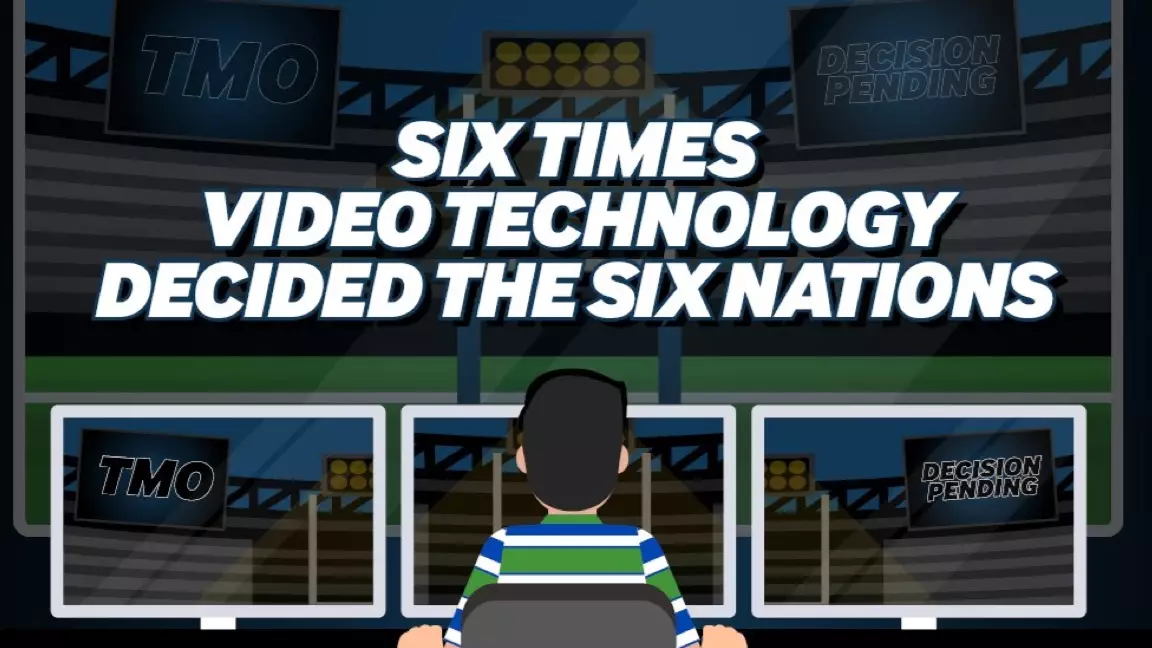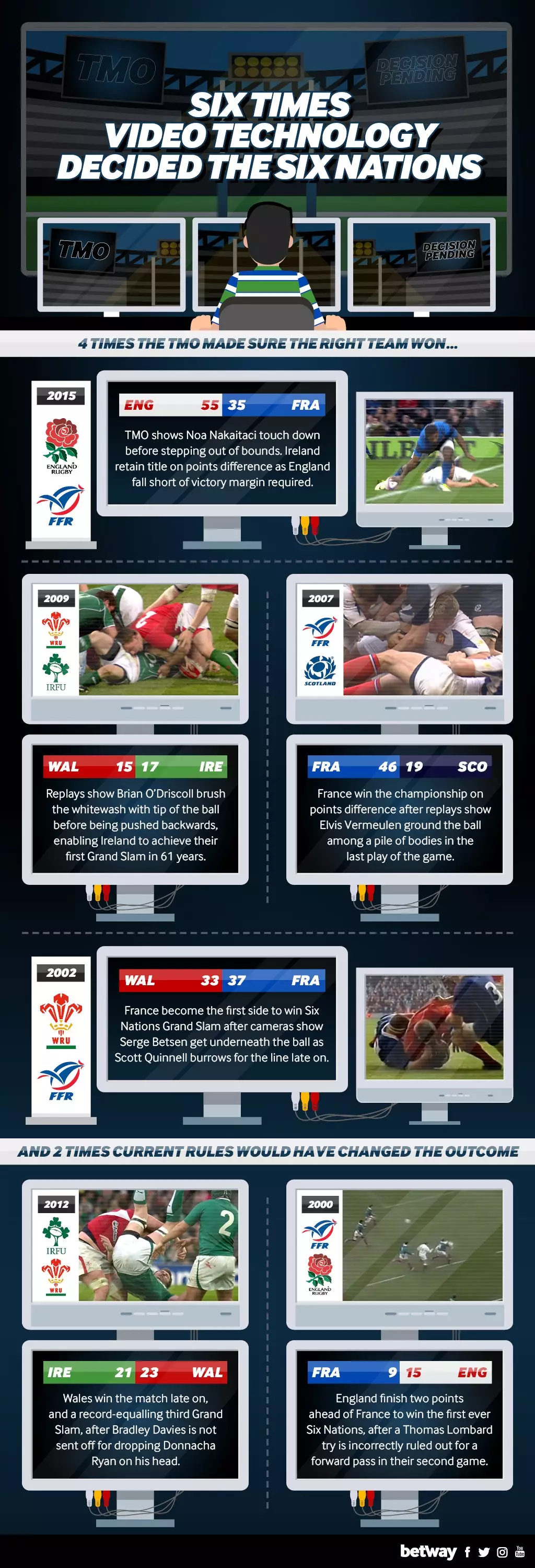
Pioneering rugby union referee Ed Morrison believes football would be "crazy" not to learn from rugby and endorse video technology.
After the early trials of VAR in the recent FA and EFL Cup ties, it is clear that plenty of suspicion still surrounds video technology in football.
Rugby, though, came out stronger the other side. This year's Six Nations will be the 18th tournament in which television match officials have been used.
Advert
Having become one of the first major sports to embrace video referees - only six years after the game had turned professional - rugby was an unlikely moderniser.
But few are better-placed to comment on the overwhelmingly positive effect that technology has had than Morrison, the Northern Hemisphere's first ever full-time rugby referee.
After retiring from officiating in 2001, having been to three World Cups and taken charge of over 40 internationals, he was influential in overseeing the introduction and establishment of the TMO in the modern game.
Speaking with Betway Insider, Morrison said: "I would be loath to be critical of football. All of us are slow to accept change in all walks of life. In rugby, some people accepted professionalism and what it meant, whereas I struggled with it.
Advert
"I realise now that I was probably quite foolish. Now we have a professional game that everybody buys into and that's great. And that's exactly what will happen with the video replay system."
In 2015, Ireland landed the Six Nations at England's expense thanks to VAR. With a replay showing Frenchman Noa Nakaitaci grounded the ball before stepping into touch, the Red Rose lost out on the Six Nations crown on points difference.
VAR rewarded the Irish with another victory in 2009, their first Grand Slam in 61 years, when the video technology revealed legendary centre Brian O'Driscoll had indeed crossed the whitewash versus Wales.

Back in 2007, video replays yet again decided the recipient of international rugby's oldest trophy with Elvis Vermeulen's try spotted among a pile of Scottish and French bodies during the last play of the game.
Advert
Back in 2002, France became the first side to win a Six Nations Grand Slam after cameras uncovered Serge Betsen's try save to deny Wales' Scott Quinnell in the closing minutes.
VAR is still developing in rugby, and only recently can referrals now be made to make decisions outside of simply try-scoring situations.
The Six Nations title may not have fallen into the hands of Wales in 2012, or England 12 years earlier had the cameras be called upon for dangerous tackles or forward passes.
Morrison knows all about tough calls. After all, it was he who, during the 1995 Rugby World Cup final, denied South Africa a try after Ruben Kruger had burrowed over the line off the back of a scrum.
Advert
South Africa, hosting their first sporting event following the end of apartheid, ultimately went on to win the game in extra time, with the trophy presentation between newly-appointed president Nelson Mandela and Springbok captain Francois Pienaar enduring as one of rugby's most iconic moments.
"Some people said to me afterwards that was definitely a try," says Morrison. "If I was refereeing that game today, would I have referred that upstairs? Yes, I would. But I'd rather people criticise me for making a mistake than for doing something dishonestly. Because if I can't see it, how can I give it? There was too much doubt for me to award that try."
That potential for ambiguity has only increased in the modern game, with players fitter, faster and stronger than ever before.
The influence of technology has therefore had to develop accordingly. Whereas in the early days, the TMO would only be called into action to clear up contentious calls about whether or not tries had been grounded or feet had strayed into touch, it is now responsible for monitoring build-up play for everything from forward passes to dangerous play. Not that it was all plain sailing.
Advert
"We had a problem at the beginning in rugby where the crowd got irritable," says Morrison. "The first game that was played in the Premiership with the TMO, I think there were something like 10 referrals. The crowd were slow hand-clapping and all hell was let loose about the amount of time it was taking."
Which is why he would urge those football fans who remain unconvinced about the new innovations to remain patient.
"These are all things that happen when you start a new process like this. Any system you bring in is complex, and you're going to have some humps and bumps along the way," he says. "The match officials have to become comfortable with the process and the system, and that sometimes takes a bit of time to bed in."
Of course, decisions in contact sports like rugby and football will always have an element of subjectivity that isn't present in non-contact sports like tennis or cricket.
That, though, should not deflect from the overall improvement in decision-making that technology has helped bring about.
"There isn't a 100 per cent, fool proof system," says Morrison. "It just doesn't exist, because human beings are human beings. People make judgments, and sometimes you disagree with those judgments.
"But it's imperative that soccer, rugby and other professional sports use the technology that's available. It would be crazy not to. More big decisions are made correctly now than ever in the history of the game. There are the odd occasions, but they are very odd."
Morrison believes that this, in turn, has subsequently improved the conduct of players and coaches.
"Their behaviour in general is fantastic, because they've got confidence in the system," he says. "How many times do you watch a soccer game on TV and the managers are going off the wall afterwards complaining about a decision?
"You don't see any instances of McEnroe going potty among tennis players, now, do you?"
And, ultimately, given the compelling case study provided by rugby, Morrison insists there's no point fighting the changes - even if they do take a bit of getting used to.
"It will probably take soccer a bit longer to come to terms with the new process. Not the players and the coaches, but the fans, because there's a lot more of them," says Morrison.
"But now it's been introduced, I don't think there will be any going back. That's what I found with rugby. All you did was move forwards, you didn't move backwards.
"You mark my words, we could have this conversation in two years' time and say: 'What were we worried about?'"
For more exclusive blogs and betting insight head over to Betway here.